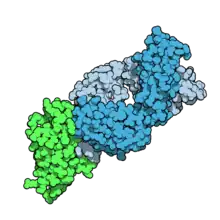Tremelimumab
Tremelimumab, sold under the brand name Imjudo, is a fully human monoclonal antibody against CTLA-4. It is an immune checkpoint blocker.
 Fab fragment of tremelimumab (blue) binding CTLA-4 (green). From PDB entry 5GGV. | |
| Monoclonal antibody | |
|---|---|
| Type | Whole antibody |
| Source | Human |
| Target | CTLA-4 |
| Clinical data | |
| Trade names | Imjudo |
| Other names | ticilimumab, CP-675, CP-675,206 |
| License data |
|
| Routes of administration | Intravenous |
| ATC code |
|
| Legal status | |
| Legal status | |
| Identifiers | |
| CAS Number | |
| IUPHAR/BPS | |
| DrugBank | |
| ChemSpider |
|
| UNII | |
| KEGG | |
| Chemical and physical data | |
| Formula | C6500H9974N1726O2026S52 |
| Molar mass | 146382.47 g·mol−1 |
| | |
Tremelimumab was approved for medical use in the United States in October 2022.[2][3]
Medical uses
Tremelimumab is indicated, in combination with durvalumab, for the treatment of adults with unresectable hepatocellular carcinoma.[1]
Mechanism of action
Tremelimumab aims to stimulate an immune system attack on tumors. Cytotoxic T lymphocytes (CTLs) can recognize and destroy cancer cells. However, there is also an inhibitory mechanism (immune checkpoint) that interrupts this destruction. Tremelimumab turns off this inhibitory mechanism and allows CTLs to continue to destroy the cancer cells.[4]
Tremelimumab binds to the protein CTLA-4, which is expressed on the surface of activated T lymphocytes and inhibits the killing of cancer cells.[5] Tremelimumab blocks the binding of the antigen-presenting cell ligands B7.1 and B7.2 to CTLA-4, resulting in inhibition of B7-CTLA-4-mediated downregulation of T-cell activation; subsequently, B7.1 or B7.2 may interact with another T-cell surface receptor protein, CD28, resulting in a B7-CD28-mediated T-cell activation unopposed by B7-CTLA-4-mediated inhibition.[5]
Unlike Ipilimumab (another fully human anti-CTLA-4 monoclonal antibody), which is an IgG1 isotype, tremelimumab is an IgG2 isotype.[6][7]
History
Previously in development by Pfizer,[8] it is in investigation by MedImmune, a wholly owned subsidiary of AstraZeneca.[9]
Melanoma
Phase I and II clinical studies in metastatic melanoma showed some responses.[10] However, based on early interim analysis of phase III data, Pfizer designated tremelimumab as a failure and terminated the trial in April 2008.[8][11]
However, within a year, the survival curves showed separation of the treatment and control groups.[12]
Mesothelioma
Although it was designated in April 2015 as orphan drug status in mesothelioma,[13] tremelimumab failed to improve lifespan in the phase IIb DETERMINE trial, which assessed the drug as a second or third-line treatment for unresectable malignant mesothelioma.[14][15]
Non-small cell lung cancer
In a phase III trial, AstraZeneca paired tremelimumab with a PD-L1 inhibitor, durvalumab, for the first-line treatment of non-small cell lung cancer.[16] The trial was conducted across 17 countries, and in July 2017, AstraZeneca announced that it had failed to meet its primary endpoint of progression-free survival.[17]
Society and culture
Names
Tremelimumab is the international nonproprietary name (INN).[18]
References
- "IMJUDO® (tremelimumab-actl) injection, for intravenous use" (PDF). AstraZeneca. U.S. Food and Drug Administration. October 2022. Archived (PDF) from the original on 27 October 2022. Retrieved 27 October 2022.
- "Imjudo: FDA-Approved Drugs". U.S. Food and Drug Administration (FDA). Retrieved 26 October 2022.
- "Imjudo (tremelimumab) in combination with Imfinzi approved in the US for patients with unresectable liver cancer". AstraZeneca (Press release). 26 October 2022. Retrieved 26 October 2022.
- Ribas A (June 2012). "Tumor immunotherapy directed at PD-1". The New England Journal of Medicine. 366 (26): 2517–9. doi:10.1056/NEJMe1205943. PMID 22658126.
- "Tremelimumab". National Cancer Institute. Retrieved 27 October 2022.
 This article incorporates text from this source, which is in the public domain.
This article incorporates text from this source, which is in the public domain. - Tomillero A, Moral MA (October 2008). "Gateways to clinical trials". Methods Find Exp Clin Pharmacol. 30 (8): 643–72. doi:10.1358/mf.2008.30.5.1236622. PMID 19088949.
- Poust J (December 2008). "Targeting metastatic melanoma". Am J Health Syst Pharm. 65 (24 Suppl 9): S9–S15. doi:10.2146/ajhp080461. PMID 19052265.
- "Pfizer Announces Discontinuation of Phase III Clinical Trial for Patients with Advanced Melanoma". Pfizer.com. 1 April 2008. Retrieved 5 December 2015.
- Mechanism of Pathway: CTLA-4 Inhibition
- Reuben JM, Lee BN, Li C, Gomez-Navarro J, Bozon VA, Parker CA, et al. (June 2006). "Biologic and immunomodulatory events after CTLA-4 blockade with ticilimumab in patients with advanced malignant melanoma". Cancer. 106 (11): 2437–44. doi:10.1002/cncr.21854. PMID 16615096.
- Ribas A, Kefford R, Marshall MA, Punt CJ, Haanen JB, Marmol M, et al. (February 2013). "Phase III randomized clinical trial comparing tremelimumab with standard-of-care chemotherapy in patients with advanced melanoma". Journal of Clinical Oncology : Official Journal of the American Society of Clinical Oncology. 31 (5): 616–22. doi:10.1200/JCO.2012.44.6112. PMC 4878048. PMID 23295794.
- Marshall MA, Ribas A, Huang B (May 2010). "Evaluation of baseline serum C-reactive protein (CRP) and benefit from tremelimumab compared to chemotherapy in first-line melanoma". Journal of Clinical Oncology. 28 (15S): 2609. doi:10.1200/jco.2010.28.15_suppl.2609.
- Duff J (17 April 2015). "FDA Grants AstraZeneca's Tremelimumab Orphan Drug Status for Mesothelioma". Mesothelioma Cancer Alliance. Archived from the original on 31 July 2016.
- Krassenstein B (29 February 2016). "Tremelimumab Fails Mesothelioma Drug Trial". FDA News Alert. Archived from the original on 6 March 2016. Retrieved 6 March 2016.
- McKee S (1 March 2016). "AZ' tremelimumab fails in mesothelioma trial". PharmaTimes. Archived from the original on 6 March 2016. Retrieved 6 March 2016.
- Adams B (27 July 2017). "AstraZeneca's immuno-oncology combo fails crucial Mystic trial in lung cancer". FierceBiotech.
- "AstraZeneca reports initial results from the ongoing MYSTIC trial in Stage IV lung cancer". AstraZeneca (Press release). 27 July 2017.
- World Health Organization (2008). "International nonproprietary names for pharmaceutical substances (INN): recommended INN: list 59". WHO Drug Information. 22 (1). hdl:10665/74120.